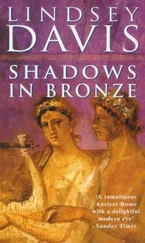‘Don’t be daft, you still have Salvia.’
Not the right answer. ‘Barren bitch.’
‘Bollocks, she’s a perfectly nice woman.’
That was debateable, for Salvia possessed a sharp tongue (she needed it), but Larius had his hands full trying to forge a passage down a narrow street against an oncoming tide of people, while the ever-descending lava fragments were darkening the world to near-impenetrable gloom. Nevertheless, since he was philosophical, he could not help reflecting.
Many a tricky situation would be exposed today. Not the duplicity of Nymphe and Erodion perhaps, though that had been close: Rufius could so easily have rushed in to find his wife, wearing fancy ear-rings that he had not bought for her, enjoying a light lunch with a strange man, who was so much at home he had brought his own comfortable house slippers. The small staff of slaves would have been disloyally hoping they could watch the post-prandial gropes. Probably the intruder would have been gulping up his egg salad from the favourite bowl of Rufius…
Narrow escape. Let’s hope we can all manage another one and get out of Pompeii.
They passed the house where Larius had been working. He jumped down, ran indoors and picked up his set of best brushes. These were British badger and squirrel hair, lovingly cleaned and cared for, each marked with his initials on the stock. Tools of his trade. The one thing you save. All over Pompeii doctors were catching up surgical instruments, surveyors were packing their measuring equipment in custom-designed satchels, priests were running away from temples with valuable objects of obscure religious design. Votive bowls were flitting mysteriously all over town.
Coming out, Larius nodded to the baker, who was standing on his doorstep looking impatient. His was the largest bread-making firm in Pompeii. He seemed to be alone now; he must have despatched his staff, slaves and freeborn, to safety. ‘Aren’t you leaving?’
‘Got a piglet and a bird half done on the cooking fire.’ The man shook himself so clouds of flour dust flew off him, mingled with fallen ash that he had acquired from standing outside among the volcanic lapilli. He coughed.
‘Madness!’ called Larius, back on the cart. ‘Forget lunch. Don’t expect us to help you eat it, not today! You need to leave.’ He had worked for this man; they had a good relationship.
There was nobody at the street bar on the corner, except his ghastly subtenant, Nonius. Nonius was working his way along all the beakers of wine that customers had abandoned half-full on the crazy-paved marble counters. He was so busy emptying saucers of olives and washing them down, he did not see Larius, who made no attempt to call out.
At the widow’s house, he turned the cart with some difficulty so it would be ready for their flight, and left Erodion in charge of it.
He ran indoors, calling for his daughter and the widow, his frail landlady, whom in kindness he intended to bring along with them. He found Marciana in a state of tearful panic. ‘She won’t leave without her cats!’
‘Oh hell. She must, chuck. It’s not safe to stay.’
The timorous old woman appeared, then began wailing. Once, she had been respectable. These days, she looked like a hag in a cave from some legend: wild strands of hair, mad eyes, a dirty tunic that she never changed, hands like claws; yet ultimately pitiful. Larius agreed to have a quick look for her pets, so with a muffled curse he started searching. He felt a professional obligation; he had drawn them from life a couple of times, since cats prowling after birds were a popular motif.
The garden was filling up with deposits; lapilli were finding their way in through open windows, ash even working under closed doors. No doubt agitated by the eruption, the damned cats were nowhere to be found. Soon Larius abandoned that crazy quest, then ran outside, back to the street with his heart bumping; breathlessly, he climbed upstairs to his room to fetch an old cloak in which to wrap up his daughter to protect her from the falling missiles. On the way he noticed several sacks of goods, a candelabra sticking out of one, which he knew must be treasure stolen from houses by his unscrupulous subtenant.
While Larius was back inside the widow’s apartment, collecting Marciana and failing to persuade the old woman to flee with them, Nonius came along the street.
He was here to pick up his plunder, pondering how he could possibly transport it. When he saw the cart outside, he thanked the gods, even though they had inconsiderately left him with a problem: what to do about Erodion? Oblivious, Erodion was still perched on the driving plank, where Larius had left him. He had the reins in his limp hands, bitterly sunk in his misery at the faithlessness of Nymphe. All around him fell the endless shower of lava, now in much larger fragments.
The widow’s house needed maintenance more than it had showed. With the weight of fallen cinders, its roof began to creak; rafter batons bowed, on the verge of failing; a loose tile slipped and fell. This heavy terracotta pantile smashed down on Erodion, gashing his head open. As he started from his trance at last, bemused by being struck so painfully, he tried to staunch the pouring blood.
Nonius picked up the heavy tile from the road. He jumped up on the cart. There, he smote the woozy market gardener again and again, holding the rooftile two-handed to batter his skull, until his victim stopped moving.
It was irrelevant now whether Erodion had fathered Nymphe’s baby. Nonius had killed him.
Nonius heaved the lifeless body off the cart, then quickly fetched his sacks of treasure and drove off. When Larius came out of the house with his daughter, who was carrying her precious basket, they saw their neighbour lying in the street. Erodion was already partly buried by a thin blanket of pumice. A pantile covered with brains lay beside his corpse.
‘He is dead,’ Marciana pronounced, hard of heart. ‘Don’t cry, dollies; he’s no loss!’ Larius had been dithering but he stopped and gazed down at her. He loved her at this age: old enough to be cheeky, though still young enough to sometimes need him. The cart they were relying on to save them had vanished yet she seemed insouciant. ‘Someone took the horsey. They won’t get far.’ Of her own accord, Marciana spun away quickly inside the house, returning without her basket. ‘Less to carry. Maybe we can come back for them… So, Father, the old lady is hiding in her pantry. It’s just you and me – time for us to get out of here!’
Ollia acts.
Slowly, slowly, the painter’s wife reached her decision. She recognised that she must not rely on Larius. She had to deal with this herself.
In Herculaneum, they did not have, or not yet, the constant fall of pumice that had been landing further south. With the wind still blowing away from them, only a light covering of ash lay here. But there was alarming geological activity, with swirling clouds of noxious gas and violent underground shudders, accompanied by constant loud noises. Ollia had always hated earthquakes. This was more extreme than anything she had ever known; it made buildings sway and threaten to come crashing down. Vesuvius was in such flux that the mountain itself was re-shaping, while the land heaved under huge pressures. Although the sky-high column of debris still held up in its enormous cloud, Ollia became terrified.
The noises were unearthly. When they lessened, her neighbourhood had an eerie quiet. Most people had left. Only invalids, the old, or the very pregnant had remained this long in their houses. Even they, if they could, had begun shuffling slowly to what they prayed was safety. Very soon the whole town would be empty. Ollia must go too.
Читать дальше












